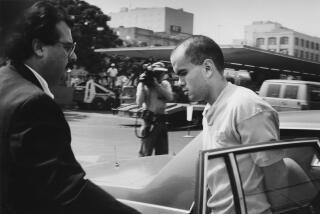City Attorney’s Office and Auto Repair Shop Suit
Acting Santa Monica City Atty. Joseph Lawrence’s letter to the editor (Nov. 7) concerning Regina Barrett and her auto repair shop compels a response.
As Barrett’s attorney, I am very familiar with the facts. The city attorney’s office filed a criminal misdemeanor complaint against Barrett for operating her auto repair shop without a business license in January, 1993. Judge David Finkel dismissed the case before it went to trial over the objections of the city attorney’s office. Apparently Lawrence still fails to understand the reason for Judge Finkel’s decision, which is quite simple: Had the city not erred when it initially denied Barrett a business license in early 1992, the subsequent prosecution never would have occurred.
The letter also contains distortions and statements that require correction. Among them:
* Lawrence erroneously claims that the city “correctly told” Barrett she needed to obtain a planning approval known as a conditional-use permit (CUP) before she could get a business license. After our firm threatened to sue the city to compel issuance of the license, the city issued one without requiring a CUP--thereby admitting that a CUP was not required.
* Lawrence suggests the evidence presented by Barrett refuting the city’s position that she needed a CUP was “meager” but that he charitably approved issuance of her license. This meager evidence consisted of Barrett’s sworn statement, a statement from the property owner, a list of six witnesses who can confirm when Barrett began conducting her business, and documentary evidence including a dated invoice verifying Barrett’s story. Lawrence’s claim that he was being charitable lacks credibility.
* He claims the city attorney’s office was willing to resolve this matter by having Barrett pay a nominal fine. He ignores that his office also demanded that she plead no contest to a criminal misdemeanor.
* He falsely claims that our law firm ran up legal fees of $10,000 in defending Barrett in this criminal action. In fact, after the city attorney’s office refused to dismiss the criminal charges, our firm represented her without charge in successfully requesting Judge Finkel to dismiss this prosecution.
* Contrary to the letter, neither Barrett nor our firm has ever accused the city attorney’s office of being responsible for the original “foul-up,” as he calls it. Barrett was denied a license because of an error made in the City’s Planning Division. When this error was corrected, the city attorney’s office should have dismissed the pending criminal charges. Our criticism of the city attorney’s office has focused on its refusal to do so after it became apparent that the charges were the result of the city’s wrongful denial of the license. Judge Finkel’s decision confirms that our criticism is well-founded.
CHRISTOPHER M. HARDING
Santa Monica
*
Regina Barrett’s case, viewed in isolation, is a small matter, but it highlights the rather peculiar sense of fairness that has taken hold in Santa Monica where businesses are concerned. Barrett was victimized by the city’s unlawful refusal to issue her a business license. As a result, she spent 18 months and thousands of dollars persuading the city to issue one.
Why, after the city had acknowledged its error and issued the license, did the city attorney’s office continue prosecuting her? Apparently, Acting City Atty. Lawrence does not understand why Barrett chose to fight back in court. Though I don’t know Barrett, the answer appears obvious: She was unwilling to take responsibility for the city’s mistakes. She fought City Hall and she won. Hopefully others will be inspired by her example.
What is most disturbing is Lawrence’s statement that “we will continue to handle these cases in the same manner.” During the past five years, his office filed approximately 3,500 criminal prosecutions stemming from alleged business license violations. This is an extraordinary number for a city the size of Santa Monica, and it needlessly adds to the city’s anti-business image. A truly progressive approach would involve a simpler, less expensive, non-criminal mechanism that could easily resolve the vast majority of these cases.
Ultimately, the city attorney’s office is accountable to the City Council for its policies and practices. The City Council should provide leadership in developing means of resolving minor business license matters that minimize the need for criminal prosecution. Perhaps Lawrence, who in fairness inherited the current system when he became acting city attorney last year, will assist the City Council in this regard. In other words, perhaps he can stop being part of the problem and become part of the solution.
TOM PYNE
Santa Monica
More to Read
Start your day right
Sign up for Essential California for news, features and recommendations from the L.A. Times and beyond in your inbox six days a week.
You may occasionally receive promotional content from the Los Angeles Times.






